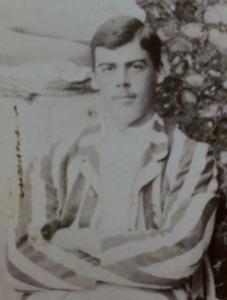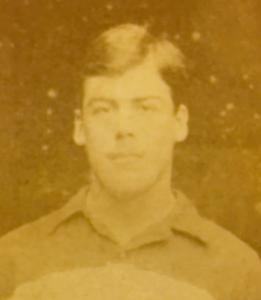
|

|
| Sergeant Nigel LOCKE (1292) | |
|
Natal Mounted Police Date of birth: 2nd January 1871 Date of death: 24th April 1901 Died of wounds aged 30 Unknown |

|
| Nigel Locke was born at Dane House, Hartlip, Kent on the 2nd of January 1871 the sixth son of Frederick Locke JP DL and Harriett Elizabeth (nee Goord) Locke of Dane House, Hartlip near Sittingbourne. He was educated at Borden Grammar School and at Lancing College where he was in School House from September 1887 to July 1890. He was a member of the Cricket XI in 1889 and 1890 and was awarded his 2nd XI Football colours in 1888. He was a member of the 1st Football XI in 1889/90. On the 24th of March 1892 he enlisted in the Natal Mounted Police with who he later served during the South African War seeing considerable action with this unit during the Second Boer War. As the history of the Natal Mounted Police relates, twenty police officers under Sergeant Locke had been attached to the Natal Volunteers for several months when they received orders to proceed from Dundee, Natal to Zululand. They rode from the Tugela River up to Melmoth, and remained there for several weeks until ordered to go on a four-day patrol to Mahlabatini. After establishing a camp near the town's magistracy, a patrol was sent out each morning before dawn, riding down the road towards Emtonjeneni, and this patrol went out as usual on the 24th of April 1901. As the men rode past a mealie patch, about two miles from Mahlabatini, a shot was fired and one of the policemen quickly galloped back to report the incident. A force of nineteen troopers and three non-commissioned officers was assembled under Nigel Locke, and they set out accompanied by Mr. Wheelwright, the magistrate, and Colonel Bottomley, a regular army officer. The men rode down the road and made a thorough search of the mealie patch but, on finding nothing, went along the veldt towards the Emtonjeneni store, about three miles away, until they reached a place where the road divided in two (the main track passing to the left, with another path going straight on through some wattle trees). Followed by four men, Wheelwright went along the main track and galloped to the top of a ridge, whereupon they came under a hail of enemy bullets – the rising sun clearly illuminated the men on the skyline, making them an easy target for the Boers concealed nearby. Upon hearing these shots, the advance party of those men that had gone along the path formed into skirmishing order and entered a patch of trees where the Boers were hiding. The policemen were almost immediately ambushed, however, and every man was killed. The rest of the police detachment then rushed to the scene, at which point a Boer named van Neikerk, "more courageous than the others", emerged from the trees and called upon the remaining policemen to surrender. They refused and van Neikerk responded by opening fire on the troopers, killing one of their horses, but was quickly shot down. The policemen then dismounted and took cover, spreading well out and opening fire whenever they saw the slightest enemy movement. Some six hours after the first shots had been fired, the Boers were finally driven off and the dead and wounded troopers were loaded onto a wagon. Nigel Locke had been seriously wounded in the opening stages of the engagement, and was found lying on the ground with his head resting on his saddle. He was, with difficulty, placed on the wagon, but the jolting proved so bad that a stretcher had to be improvised. Most of the troopers had, however, returned to their camp at Mahlabatini by this stage, and there were not enough men to carry Locke's stretcher. Fortunately, a group of thirty natives then appeared and, as the history of the Natal Mounted Police recounts, "They were told to carry the stretcher in which Sergeant Locke was lying, but they were in a violent frame of mind. "We cannot do it, we want to fight", they replied emphatically. It was only when the barrel of a revolver was held close to the Induna's [native leader's] head that he ordered eight of his men to act as bearers, and this they did with reluctance." Locke was, however, mortally wounded and died that same evening. He was buried with four of his troopers the following morning and, as nothing better could be found, their graves were marked with rough crosses made from biscuit boxes. It was later ascertained that the Boer force had numbered about one hundred and fifty, eleven of whom were killed by the Natal Mounted Police. The remainder of the enemy fell back and, convinced that they had been opposed by an entire regiment, killed their native spies who had told them that there were only a few policemen in the area. When the Boers eventually discovered how many troopers had been defending Mahlabatini, they sent along "a rather disconcerting message" to the effect that they would visit the camp on the first moonlit night and kill every man there, a threat that was never carried out. Tributes to the bravery of the Natal Mounted Police poured in, and Lord Kitchener, the commander-in-chief, issued the following telegram immediately after the engagement:- "Please express to the chief magistrate and civil commissioner, Zululand, and to Natal Police, my appreciation of the gallant defence of the Mahlabatini magistracy, by the magistrate and staff and field force of the Natal Police. I greatly regret their heavy loss, but in such a brilliant action losses are inevitable. Please send names of any men who have distinguished themselves." The Prime Minister, Lord Salisbury, also sent a telegram on behalf of the British Government:- "The Government has learnt with deep regret of the loss of so many brave lives in the attack on the Mahlabatini magistracy yesterday morning. It desires, however, to express its admiration of the brilliant manner in which the Natal Police field force acquitted itself on that occasion, when attacked with overwhelming strength, with the result that the attack was repulsed and the enemy were defeated. I beg of you to be good enough to convey this expression of appreciation to the remaining members of the field force who took part in the engagement." When news of Nigel Lock' |
|
 | |
| School House |
Back